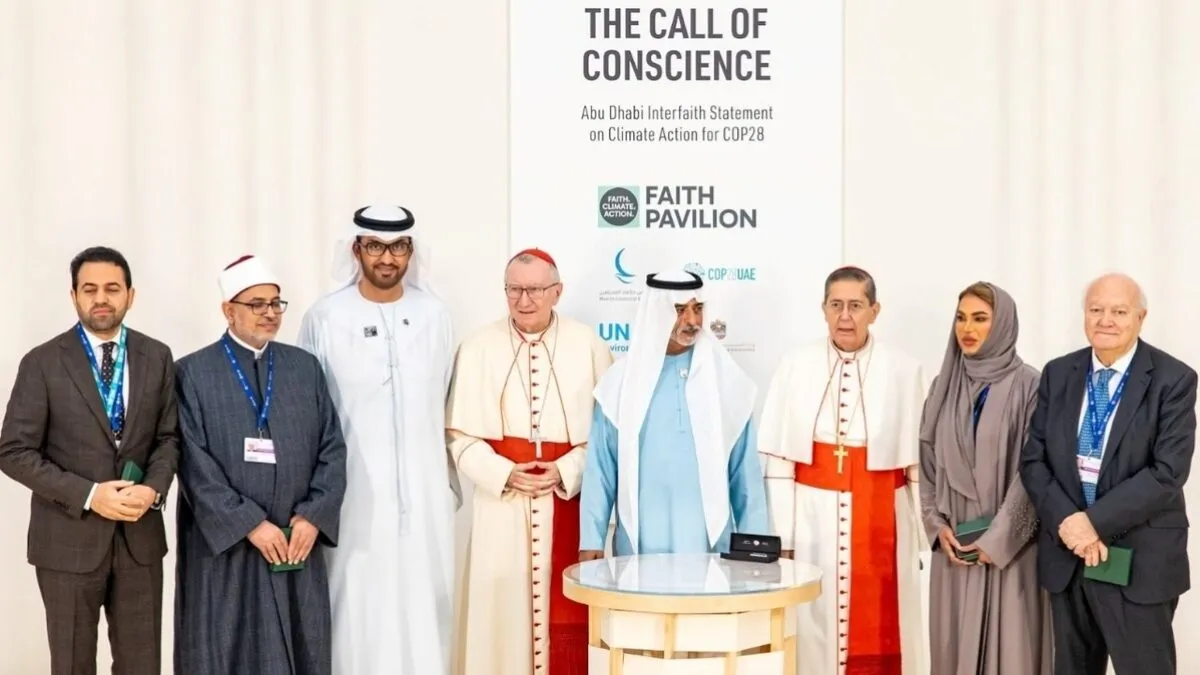(IPS) – For the first time at COP28, faith has a pavilion alongside science, technology, nations, and philanthropy, allowing religious leaders from all over the world to discuss the potential for using spiritual merits to protect the earth from climate change.
Syed Salman Chishty, representing India’s largest spiritual shrine, Ajmer Sharief, gave IPS the rationale for the pavilion: “As we gather at COP28, we are reminded of the importance of justice and compassion as guiding principles for transformation—this is the overarching theme of the event—the need for genuine change rooted in universal values found in diverse cultures.”
The Ajmer Sharief shrine is the tomb of Moinuddin Chishti, a 13th-century Iranian Sufi saint and philosopher who made India his final abode. People of all faiths venerate his shrine, which is often described as a symbol of India’s pluralism.
The Faith Pavilion at COP28 has also brought together heads of countries, religious leaders, scientists, and activists in a united front against the looming threat of climate change. Among the dignitaries present at its opening was Indian Prime Minister Narendra Modi, who stood shoulder-to-shoulder with spiritual luminaries, climate activists, and representatives of global think tanks.

The Coalition of Faith Partners and the USA both supported the initiative, which has co-hosts like the UAE’s Ministry of Tolerance and Coexistence, Judge Mohamed AbdlSalaam of the Muslim Council of Elders in Abu Dhabi, and Iyad Abumoghil, Director of Faith for Earth at the UN Environment Program (UNEP) in Nairobi.
The Faith Pavilion at COP28 aims to tap into the power of faith communities and religious institutions to address the climate crisis. A diverse array of leaders congregated to explore the potential of spirituality in combating environmental challenges. The discussions were not merely about policies and technologies; rather, they delved into the profound realms of justice, compassion, and conscious transformation.
The Call to Consciousness event panel featured international delegates such as Audrey Kitagawa, founder and President of the International Academy for Multicultural Cooperation in the USA; Ben Bowler, Executive Director of Unity Earth in Australia; Ambassador Mussie Hailu of the United Religious Initiative in Ethiopia; Surender Singh Kandhari, chair of Gurudwara Gurunanak Darbar in Dubai; and Rocky Dawuni, a musician and Global Peace Ambassador of UNEP from Ghana.
The leaders at the Faith Pavilion, says Chishty, emphasized the cultivation of three attitudes towards nature: sunlight-like grace, river-like generosity, and earth-like hospitality. These attitudes, they argued, could serve as a blueprint for individuals to integrate into their daily lives. By doing so, they believed that these principles could bridge differences and divisions in the collective service of others.
“The call for unity in diversity echoed through the discussions, inspired by the teachings of our saint, Khwaja Garib Nawaz, also known as the patron saint of the poor. It was a celebration of the interconnectedness of humanity and nature, urging everyone to look beyond borders and backgrounds in the pursuit of a shared goal: combating climate change,” Chishty said.
He added that the Faith Pavilion at COP28 became a platform not only for dialogue but also for the formulation of actionable strategies. “The leaders recognized the urgency of the situation and committed to translating the discussions into tangible initiatives. The combination of spiritual wisdom, scientific knowledge, and the collective will of diverse faith communities generated a sense of hope and purpose,” Chishty.
According to him, the event marked a departure from conventional approaches to climate change discussions. “It acknowledged that addressing the environmental crisis requires more than technological advancements and policy changes; it necessitates a profound shift in consciousness and values. The Faith Pavilion was a testament to the understanding that faith, when aligned with a shared vision, has the potential to drive transformative change on a global scale,” Chisty said.
According to him, once the deliberations in the Faith Pavilion were concluded, the participants left with a renewed sense of purpose and a shared commitment to take concrete actions in the fight against climate change.
“The fusion of faith, science, and activism paved the way for a new chapter in the global response to environmental challenges—a chapter written with the ink of unity, compassion, and a deep reverence for the interconnectedness of all life on Earth,” Chishty concluded.
IPS UN Bureau Report
